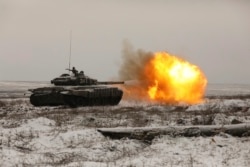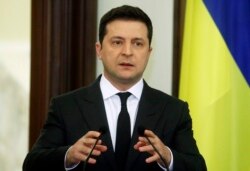The United States and its allies from the North Atlantic Treaty Organization spoke with one voice in urging Russia to de-escalate tensions along Ukraine’s border and continue talks over issues including arms control.
Russia and NATO officials met in Brussels Wednesday with a focus on alleviating the dangerous situation along the border. The U.S. said NATO allies have offered ideas for reciprocal actions to reduce risks, improve transparency and communication and arms control.
U.S. Deputy Secretary of State Wendy Sherman, who leads the U.S. delegation, said the NATO-Russia meeting ended with “a sober challenge” for Moscow to reduce tensions and “choose the path of diplomacy, to continue to engage in honest and reciprocal dialogue so that together we can identify solutions that enhance the security of all.”
“There was no commitment to de-escalate, nor was there a statement that there would not be,” said Sherman during a press conference Wednesday, after the nearly four-hour meeting.
She added Russia heard loudly and clearly it is very hard to have diplomacy when 100,000 of its troops are massed along the Ukrainian border, and as live fire exercises are being conducted.
NATO Secretary-General Jens Stoltenberg said he has proposed the idea of a series of meetings with Russia, which asked for time to return with an answer.
"NATO allies are ready to engage in dialogue with Russia, but we will not compromise on core principles, we will not compromise on the sovereignty and territorial integrity of every nation in Europe," Stoltenberg told reporters in Brussels.
Meanwhile, Ukrainian President Volodymyr Zelenskiy proposed a new international summit to end the crisis.
"It is time to agree in a substantive manner on an end to the conflict, and we are ready to take the necessary decisions during a new summit of the leaders of the four countries," Zelenskiy said Tuesday in a statement following a meeting with European diplomats.
In Washington, Democratic lawmakers Wednesday proposed a comprehensive sanctions package to deter Russia from further aggression.
The Defending Ukraine Sovereignty Act of 2022 would impose crippling sanctions on the Russian banking sector and senior military and government officials if Russian President Vladimir Putin escalates hostile action against Ukraine.
NATO objects to Russia troop buildups along the border, saying they undermine European security. For its part, Russia is seeking security guarantees such as limiting the expansion of the 30-member NATO alliance, arguing the inclusion of a country like Ukraine on its border represents a threat.
U.S. Ambassador to NATO Julianne Smith told reporters ahead of Wednesday’s talks that the NATO side is committed to seeing if diplomacy can de-escalate the situation, and that the overall themes of the discussion would be about “risk reduction, transparency, arms control, and various ways in which we communicate with each other.”
Smith expressed U.S. solidarity with Ukraine, adding that “Russian actions have precipitated this crisis” and NATO allies were ready to deter further Russian aggression.
“Should Russia follow the path of confrontation and military action, we’ve made it clear to the Kremlin that we will respond resolutely, including with a range of high-impact economic measures,” Smith said. “As an alliance, we are prepared to reinforce NATO’s defense on the eastern flank, and we are prepared to impose severe costs for further Russian aggression in Ukraine.”
Wednesday’s meeting was the second of three opportunities this week for U.S. and European diplomats to speak directly with Russian officials about the situation with Ukraine. The Organization for Security and Cooperation in Europe meets Thursday in Vienna.
In Geneva on Monday, U.S. and Russian diplomats held their own session, with both sides signaling no major progress afterward.
Kremlin spokesman Dmitry Peskov said Tuesday the talks in Geneva were “open, comprehensive and direct,” an assessment echoed by Washington. But Peskov said it was the result that ultimately matters.
“So far, let’s say we see no significant reason for optimism,” he said in a conference call with reporters.
Victoria Nuland, U.S. undersecretary of state for political affairs, told reporters Tuesday that the U.S. has not seen the slightest hint of de-escalation on Russia’s part. “It is Russia that created this crisis out of whole cloth” by deploying 100,000 troops just across from Ukraine’s eastern border.
At the Geneva talks, Moscow demanded guarantees, rejected by the United States, that NATO halt further eastward expansion toward Russia and curb military deployments in eastern Europe.
“NATO poses no threat to Russia. It is a defensive alliance whose sole purpose is to protect its members,” Nuland said.
Western allies fear that Russia is planning to invade Ukraine after annexing its Crimean Peninsula in 2014. Russia has denied it plans to invade the former Soviet republic but also has not agreed to U.S. demands that it withdraw troops from the border.
U.S. President Joe Biden has ruled out a military confrontation with Russia in the event it decides to attack Ukraine, but he says the U.S. and its allies would impose significant economic sanctions if Russia does invade.
(VOA’s Chris Hannas contributed to this report.)






